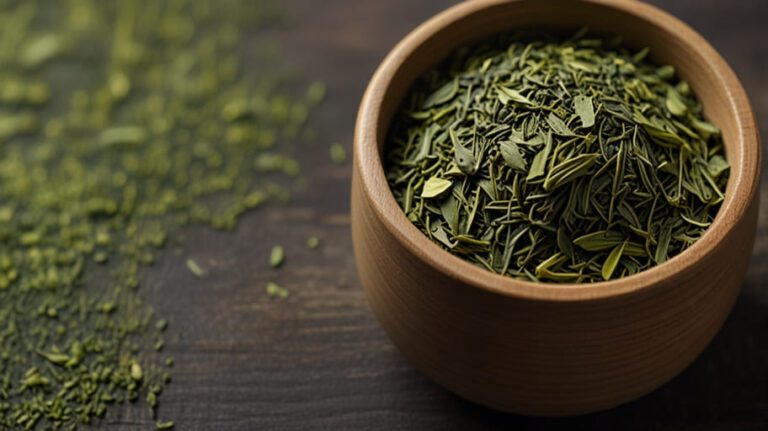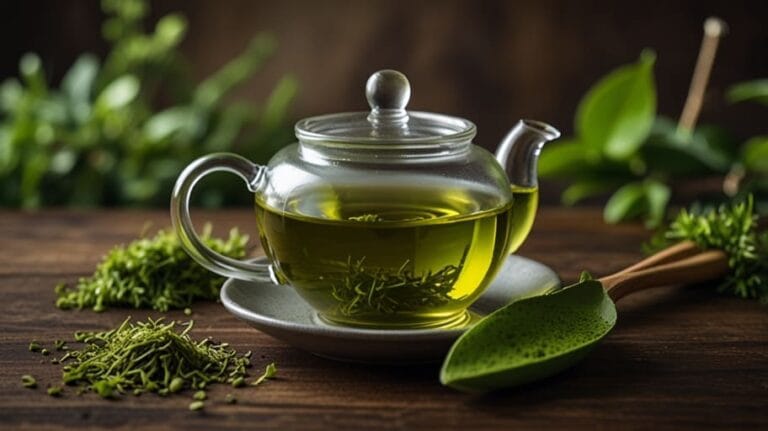Green tea has been cherished for centuries for its remarkable health benefits, and two of the most celebrated varieties are sencha and matcha. Both these teas originate from Japan, where tea culture is deeply rooted in tradition and health consciousness. Whether you’re a tea enthusiast or someone seeking a healthier lifestyle, understanding the sencha and matcha green tea benefits can help you make informed choices for your well-being.
What is Sencha Green Tea?
Sencha green tea is one of Japan’s most popular and widely consumed green teas. It is made from steamed, handpicked leaves that are then rolled and dried. This traditional Japanese tea is known for its light, fresh flavor with subtle vegetal notes, making it a delightful choice for those who prefer a mild taste. The leaves are carefully processed to retain their nutrients, giving Sencha a rich profile of antioxidants, vitamins, and minerals.
Nutritional Value of Sencha Green Tea
Sencha green tea is packed with essential nutrients that contribute to its reputation as a healthful drink. Here’s a closer look at its nutritional profile:
Antioxidants
Sencha is particularly rich in catechins, which are powerful antioxidants that protect cells from damage caused by free radicals. These antioxidants have been linked to a reduced risk of chronic diseases, including heart disease and cancer. Consuming Sencha regularly can help boost the body’s natural defense system and maintain overall health. Why You Should Drink this Tea Daily: 10 Amazing Benefits of Ginger and Mint Tea
Vitamins and Minerals
Sencha is a source of several vitamins, including Vitamin C and Vitamin A, both of which play critical roles in immune function and eye health. It also contains small amounts of calcium and magnesium, important for bone health and muscle function. The combination of these nutrients makes Sencha a well-rounded beverage that supports various bodily functions.
Caffeine Content
Sencha contains a moderate amount of caffeine, providing a gentle energy boost without the jitteriness associated with coffee. This makes it an excellent choice for a morning pick-me-up or a mid-afternoon break. The L-theanine in Sencha also helps to promote relaxation and mental clarity, balancing the stimulating effects of caffeine.
What is Matcha Green Tea?
Matcha green tea is unique in that it is a powdered form of green tea made from shade-grown leaves. The leaves are carefully processed, then ground into a fine powder, which is whisked into hot water. This traditional Japanese tea offers a vibrant green color and a robust, umami taste that is quite different from Sencha. Matcha provides a concentrated source of nutrients, making it a potent health booster.
Nutritional Value of Matcha Green Tea
Matcha green tea is an exceptionally nutrient-rich beverage. Here’s what makes Matcha stand out:
High Antioxidant Content
Matcha contains the highest level of antioxidants among all green teas, including a potent form known as EGCg (epigallocatechin gallate). This powerful catechin has been shown to offer significant health benefits, including cancer prevention and heart health. The high antioxidant content makes Matcha particularly effective in fighting free radicals and reducing oxidative stress. Why You Should Drink this Tea Daily: 10 Amazing Benefits of Ginger and Mint Tea
Vitamins and Minerals
Matcha is rich in several key vitamins and minerals, including Vitamin C, Vitamin A, iron, and potassium. These nutrients support immune health, improve skin appearance, and contribute to overall bodily functions. The combination of vitamins and minerals in Matcha makes it a superfood that nourishes the body from the inside out.
Caffeine Content
Matcha contains more caffeine than Sencha, but it also includes L-theanine, an amino acid that promotes relaxation and concentration. This unique combination provides sustained energy and mental alertness without the jitters commonly associated with coffee. It’s an excellent choice for those who need a long-lasting energy boost or a mental performance enhancer.
Differences Between Sencha and Matcha Green Tea

While both Sencha and Matcha green teas offer impressive health benefits, they differ in several key aspects:
Processing Methods
The most significant difference between Sencha and Matcha is the processing method. Sencha is steamed, while Matcha is shade-grown and ground into powder. This affects the flavor, nutrient concentration, and antioxidant levels in each tea. Powerful Orange Peel Oil Benefits for Skin: Why It’s Great for Your Skin
Taste and Flavor
Sencha has a lighter, more delicate flavor, while Matcha is bold and umami-rich. This difference makes Sencha a great choice for those who prefer milder tastes, while Matcha caters to those who enjoy a more intense and earthy flavor.
Caffeine Content
Matcha contains more caffeine than Sencha, but it also includes the calming effects of L-theanine, which helps offset potential jitteriness. Sencha provides a moderate caffeine boost without the added benefits of L-theanine.
Nutrient Concentration
Matcha, in its powdered form, contains higher concentrations of nutrients, including antioxidants and catechins. Sencha, on the other hand, retains a balanced profile of nutrients but may not have as high a concentration as Matcha.
What Sets Sencha and Matcha Green Tea Apart?
Before diving into the benefits, it’s essential to understand the differences between sencha and matcha. Sencha is a traditional Japanese green tea made from steamed and rolled tea leaves. It’s brewed into a golden-green liquid with a slightly sweet and grassy flavor. Matcha, on the other hand, is a powdered green tea made by grinding whole tea leaves. When consumed, matcha provides the entirety of the leaf’s nutrients, making it more concentrated.
Despite their differences, both teas share numerous health benefits. Let’s explore the sencha and matcha green tea benefits in detail.
1. Rich in Antioxidants
One of the most remarkable sencha and matcha green tea benefits is their high antioxidant content. Both teas are packed with catechins, a type of natural phenol and antioxidant. Matcha, however, contains significantly more catechins because it uses the entire leaf. These antioxidants combat oxidative stress, reducing the risk of chronic diseases like cancer and heart disease. Drinking sencha and matcha regularly can help neutralize harmful free radicals in the body, keeping you healthier and more youthful. Top 15 Surprising Benefits of Rosemary Plant Indoors Health, Wellness, and Beauty
2. Boosts Energy and Focus
Another fantastic benefit of sencha and matcha green tea is their ability to enhance energy and mental clarity. Both contain caffeine, but the presence of L-theanine, an amino acid unique to tea, makes the caffeine release slower and steadier. This results in a calm yet focused energy, unlike the jittery rush often associated with coffee. For individuals who require sustained concentration, the sencha and matcha green tea benefits in this area are invaluable.
3. Supports Weight Loss and Metabolism
If weight management is one of your goals, you’ll be pleased to know about the sencha and matcha green tea benefits in promoting fat loss. These teas enhance the body’s metabolic rate, helping to burn calories more efficiently. Matcha, in particular, has been shown to increase thermogenesis, the process by which the body burns calories to produce heat. Combined with a balanced diet and exercise, sencha and matcha can be effective tools in achieving a healthier weight.
4. Enhances Heart Health
Heart disease remains a leading cause of death worldwide, but the regular consumption of green tea can significantly reduce this risk. The sencha and matcha green tea benefits for cardiovascular health are well-documented. Both teas help lower LDL (bad) cholesterol and improve HDL (good) cholesterol levels. They also reduce blood pressure and improve arterial function, protecting the heart from disease.
5. Detoxifies the Body
Matcha, in particular, is renowned for its detoxifying properties. Grown under shade, matcha leaves develop high levels of chlorophyll, a natural detoxifier. This helps eliminate heavy metals and toxins from the body. While sencha also offers detoxification benefits, matcha takes it a step further because it uses the whole leaf. For those looking to cleanse their system, the sencha and matcha green tea benefits in this regard are unparalleled.
6. Strengthens the Immune System
Both sencha and matcha are rich in vitamins and minerals that bolster the immune system. The catechins in these teas exhibit antimicrobial properties, protecting the body against infections. Drinking them daily can help you stay resilient against colds, flu, and other illnesses. This makes the sencha and matcha green tea benefits especially important during seasonal changes when immunity tends to dip.
7. Promotes Healthy Skin
Green tea has long been associated with beauty, and for good reason. The sencha and matcha green tea benefits extend to skincare as well. Antioxidants in these teas fight free radicals that cause premature aging, while their anti-inflammatory properties help reduce redness and irritation. Regular consumption can lead to glowing, youthful skin. Matcha, with its concentrated nutrients, can also be used in DIY face masks for topical application. Powerful Orange Peel Oil Benefits for Skin: Why It’s Great for Your Skin
8. Aids in Digestive Health
If you struggle with digestive issues, the sencha and matcha green tea benefits can offer relief. These teas improve gut health by encouraging the growth of beneficial bacteria while reducing harmful bacteria. The natural compounds in green tea also help soothe the digestive tract, reducing bloating and discomfort.
9. Reduces Stress and Promotes Relaxation
Modern life can be stressful, but the calming effects of green tea are a natural remedy. L-theanine, abundant in both sencha and matcha, promotes relaxation without drowsiness. By balancing your mood and reducing stress hormones, the sencha and matcha green tea benefits help you maintain emotional well-being.
10. Regulates Blood Sugar Levels
Managing blood sugar is critical for preventing diabetes and other metabolic disorders. The sencha and matcha green tea benefits include improved insulin sensitivity and reduced blood sugar levels. These teas slow the absorption of sugar in the bloodstream, helping maintain stable glucose levels. Top 15 Surprising Benefits of Rosemary Plant Indoors Health, Wellness, and Beauty
How to Incorporate Sencha and Matcha into Your Daily Routine


Both Sencha and Matcha can be easily incorporated into your daily routine to enjoy their health benefits. Here’s how:
Brewing Sencha Green Tea
- Method: To brew Sencha, steep 1-2 teaspoons of leaves in hot water (about 75-85°C or 165-185°F) for 1-3 minutes. The resulting tea can be enjoyed hot or chilled over ice.
- Ideal Time: Sencha can be consumed in the morning or early afternoon to benefit from its moderate caffeine content.
Preparing Matcha Green Tea
- Method: To make Matcha, whisk 1 teaspoon of Matcha powder with 2 ounces of hot water (about 70-80°C or 158-176°F) until smooth. Enjoy it as a tea or add it to lattes, smoothies, or baked goods.
- Ideal Time: Matcha can be consumed in the morning or afternoon, or before workouts for a sustained energy boost.
Adding to Recipes
Both Sencha and Matcha can be used in various culinary creations. Matcha is particularly versatile and can be added to smoothies, oatmeal, yogurt, and even used as a natural food dye for cakes and desserts. Sencha can be incorporated into marinades, soups, and stews to add flavor and nutrition.
The sencha and matcha green tea benefits are numerous and impactful, touching nearly every aspect of health and wellness. From boosting energy and metabolism to enhancing heart health and skin vitality, these teas offer a natural and effective way to support a healthier lifestyle. Whether you prefer the light, refreshing taste of sencha or the rich, creamy flavor of matcha, both teas are valuable additions to your daily routine. Incorporating these nutrient-rich teas into your daily routine can help support mental clarity, boost metabolism, and enhance overall well-being. Whether consumed hot, cold, or in various recipes, both Sencha and Matcha offer a delicious and healthful way to stay hydrated and energized throughout the day.
So, why not make green tea a part of your life today? The sencha and matcha green tea benefits await you, offering a delicious and health-packed journey toward well-being.
FAQs
1. What are the primary differences between Sencha and Matcha green tea
Sencha and Matcha differ mainly in their preparation and flavor profile. Sencha is a steamed, loose-leaf green tea that offers a light, refreshing taste with a moderate caffeine content. Matcha, on the other hand, is a powdered green tea made from shade-grown leaves, providing a stronger umami flavor and a higher concentration of nutrients, including antioxidants and catechins.
2. How much caffeine does Matcha contain compared to Sencha
Matcha contains more caffeine than Sencha due to the whole powdered leaves, but it also includes L-theanine which helps balance the caffeine’s stimulating effects. Sencha provides a more moderate caffeine boost, making it suitable for those who want to avoid excessive stimulation.
3. Can Matcha replace coffee for an energy boost?
Yes, Matcha can be a great coffee alternative for those seeking a sustained energy boost throughout the day without the jitters. Its caffeine content, combined with L-theanine, offers a steady release of energy, unlike coffee which may cause a quick spike followed by a crash.
4. How should I prepare Sencha and Matcha green tea?
For Sencha: Use 1-2 teaspoons of leaves per cup with water heated to 75-85°C (165-185°F). Steep for 1-3 minutes.
For Matcha: Whisk 1 teaspoon of Matcha powder in 2 ounces of hot water (about 70-80°C or 158-176°F) until smooth. It can also be added to lattes, smoothies, or desserts.
5. What are some culinary uses for Matcha and Sencha?
Sencha: It can be used in soups, marinades, salads, and even ice cream.
Matcha: It’s perfect for baking, smoothies, lattes, and even savory dishes like noodles and sauces.
















